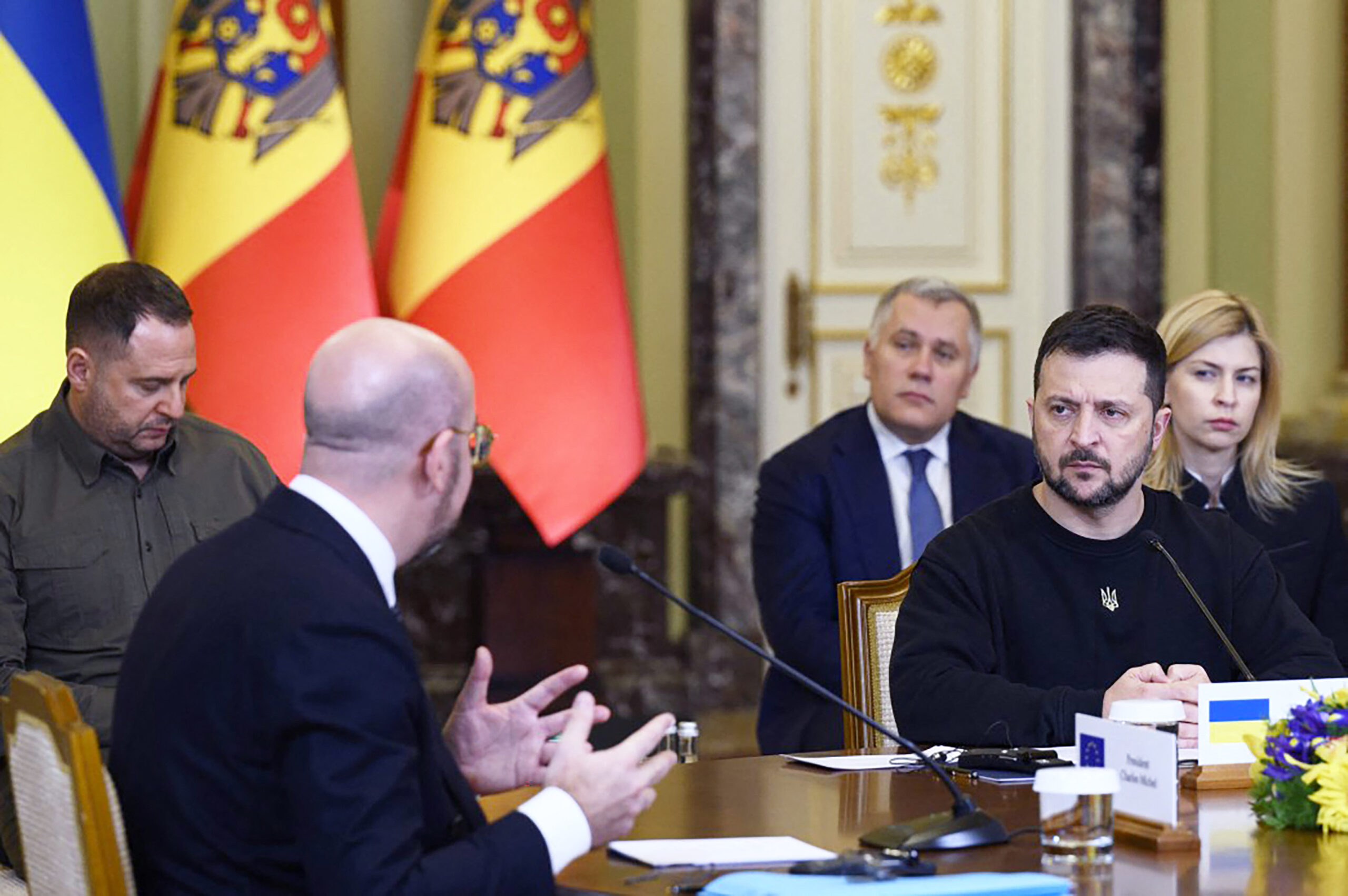EU launches ‘historic’ membership talks with Ukraine, Moldova

This handout picture taken and released by the Ukrainian Presidential press service on November 21, 2023, shows Ukrainian President Volodymyr Zelensky (R) and European Council President Charles Michel (L) speaking during their meeting, in downtown Kyiv, amid the Russian invasion of Ukraine. FILE PHOTO/Agence France-Presse
LUXEMBOURG — The European Union on Tuesday kicked off accession negotiations with Ukraine and Moldova, setting the fragile ex-Soviet states on a long path towards membership that Russia has tried to block.
The landmark move signals in particular a vote of confidence in Kyiv’s future at a time when Moscow has momentum on the battlefield almost two and a half years into the Kremlin’s invasion.
“Dear friends, today marks the beginning of a new chapter in the relationship between Ukraine and the European Union,” Ukraine’s Prime Minister Denys Shmygal said via videolink at the start of the talks.
READ: Nato keeps eye on Moldova’s skies as European leaders gather
President Volodymyr Zelensky called it a “historic day” as officials from Kyiv and the EU’s 27 member states met in Luxembourg.
Article continues after this advertisement“We will never be derailed from our path to a united Europe and to our common home of all European nations,” the Ukrainian leader wrote on social media.
Article continues after this advertisementUkraine and later Moldova lodged their bids to join the EU in the aftermath of Russia’s assault in February 2022.
The opening of the talks marks just the beginning of a protracted process of reforms in Ukraine that is strewn with political obstacles and will likely take many years — and may never lead to membership.
READ: EU grants Ukraine membership talks in midst of war, bypassing Hungarian objections
Standing in the way along that journey will be not just Russia’s efforts at destabilization but reticence from doubters inside the EU, most notably Hungary.
But European Commission chief Ursula von der Leyen called the opening of talks “very good news for the people of Ukraine, Moldova, and the entire European Union”.
“The path ahead will be challenging but full of opportunities,” she wrote on X on Tuesday.
‘Fast way’
So far, Ukraine has won plaudits for kickstarting a raft of reforms on curbing graft and political interference, even as war rages.
Ukraine’s lead negotiator, Deputy Prime Minister Olga Stefanishyna, vowed that Kyiv “will be able to complete everything before 2030” to join the bloc.
Russia’s war in Ukraine has reinvigorated a push in the EU to take on new members, after years in which countries particularly in the Western Balkans made little progress on their hopes to join.
The EU in December 2023 also granted candidate status to Georgia, another of Russia’s former Soviet neighbors.
It likewise approved accession negotiations with Bosnia and has talks ongoing with Serbia, Montenegro, Albania and North Macedonia.
The meetings with Ukraine and Moldova on Tuesday will set off a process of screening of how far laws in the countries already comply with EU standards and how much more work lies ahead.
Once that is done the EU then has to begin laying out conditions for negotiations on 35 subjects, ranging from taxation to environmental policy.
Stefanishyna said the next step should come in early 2025.
‘Stronger together’
EU countries pushed to start the talks now before Hungary — the friendliest country to Russia in the bloc — takes over the EU’s rotating presidency next month.
Budapest has been opposed to pressing ahead with Kyiv’s membership bid, arguing that Ukraine was unfairly moving ahead for political reasons.
“From what I see here as we speak, they are very far from meeting the accession criteria,” Hungary’s Europe minister Janos Boka said on Tuesday.
Accepting Ukraine — a war-ravaged country of some 40 million people — would be a major step for the EU, and there are calls for the bloc to carry out reforms to streamline how it works before accepting new members.
The start of the talks resonates powerfully in Ukraine, as it was a desire for closer ties with the EU that sparked protests back in 2014 that eventually spiraled into the full-blown crisis with Russia.
The negotiations also come at a tense time in Moldova after the United States, Britain and Canada warned of a Russian “plot” to influence the country’s presidential elections in October.
Wedged between Ukraine and EU member Romania, Moldova’s pro-Western authorities frequently accuse the Kremlin of interfering in its internal affairs.
President Maia Sandu has accused Moscow, which has troops stationed in a breakaway region of the country, of aiming to destabilize Moldova ahead of the vote.
“Our future is within the European family,” Sandu wrote on X. “We are stronger together.”